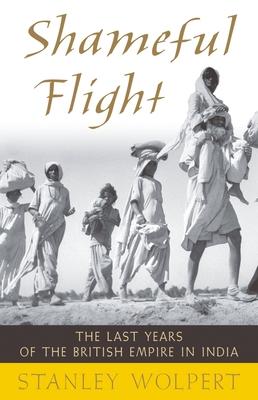
Book
Shameful Flight: The Last Years of the British Empire in India
(Write a Review)
$28.49
Ranging from the fall of Singapore in 1942 to the assassination of Mahatma Gandhi in 1948, Shameful Flight provides a vivid behind-the-scenes look at Britain's decision to divest itself from the crown jewel of its empire. Stanley Wolpert, a leading authority on Indian history, paints memorable portraits of all the key participants, including Gandhi, Churchill, Attlee, Nehru, and Jinnah, with special focus on British viceroy, Lord Louis Mountbatten. Wolpert places the blame for the catastrophe largely on Mountbatten, the flamboyant cousin of the king, who rushed the process of nationhood along at an absurd pace. The viceroy's worst blunder was the impetuous drawing of new border lines through the middle of Punjab and Bengal. Virtually everyone involved advised Mountbatten that to partition those provinces was a calamitous mistake that would unleash uncontrollable violence. Indeed, as Wolpert shows, civil unrest among Muslims, Hindus, and Sikhs escalated as Independence Day approached, and when the new boundary lines were announced, arson, murder, and mayhem erupted. Partition uprooted over ten million people, 500,000 to a million of whom died in the ensuing inferno.
Here then is the dramatic story of a truly pivotal moment in the history of India, Pakistan, and Britain, an event that ignited fires of continuing political unrest that still burn in South Asia.
Ranging from the fall of Singapore in 1942 to the assassination of Mahatma Gandhi in 1948, Shameful Flight provides a vivid behind-the-scenes look at Britain's decision to divest itself from the crown jewel of its empire. Stanley Wolpert, a leading authority on Indian history, paints memorable portraits of all the key participants, including Gandhi, Churchill, Attlee, Nehru, and Jinnah, with special focus on British viceroy, Lord Louis Mountbatten. Wolpert places the blame for the catastrophe largely on Mountbatten, the flamboyant cousin of the king, who rushed the process of nationhood along at an absurd pace. The viceroy's worst blunder was the impetuous drawing of new border lines through the middle of Punjab and Bengal. Virtually everyone involved advised Mountbatten that to partition those provinces was a calamitous mistake that would unleash uncontrollable violence. Indeed, as Wolpert shows, civil unrest among Muslims, Hindus, and Sikhs escalated as Independence Day approached, and when the new boundary lines were announced, arson, murder, and mayhem erupted. Partition uprooted over ten million people, 500,000 to a million of whom died in the ensuing inferno.
Here then is the dramatic story of a truly pivotal moment in the history of India, Pakistan, and Britain, an event that ignited fires of continuing political unrest that still burn in South Asia.
Paperback
$28.49